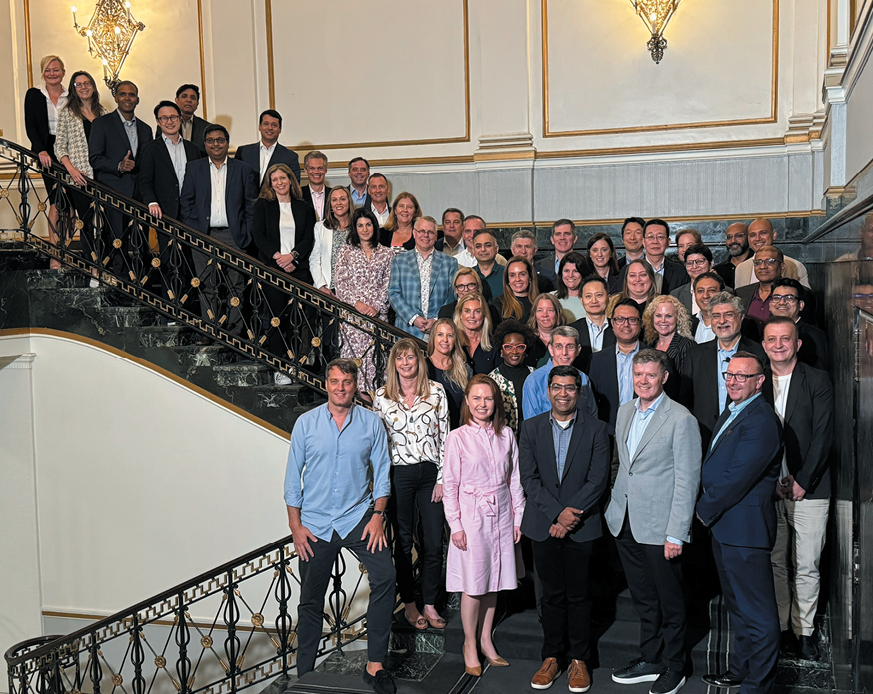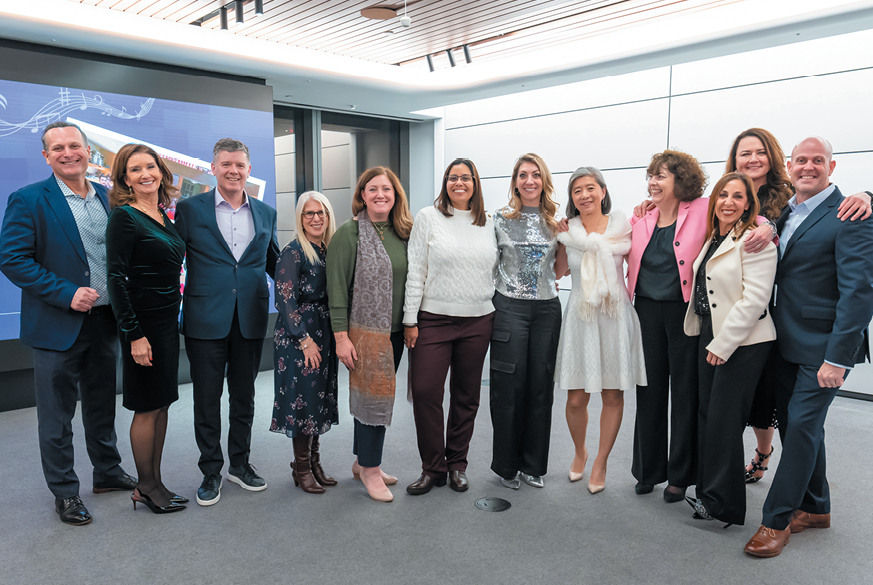- Home
- Media Kit
- MediaJet
- Current Issue
- Past Issues
- Ad Specs-Submission
- Reprints (PDF)
- Photo Specifications (PDF)
- Contact Us
- PRIVACY POLICY
- TERMS OF USE
![]()
ONLINE
![]()
ONLINE

A People-Powered Business
Editors’ Note
As EY Global Vice Chair – Talent, Trent Henry focuses on the convergence of talent and markets agendas for its approximately 400,000 EY people and its clients worldwide. This includes advising on and responding to changes and opportunities in the evolution of the global workforce. Henry is CPA-qualified and was most recently EY Canada Chairman and Chief Executive Officer. Prior to that, he spent two years as Managing Partner of EY Canada Canadian Tax services. During this time, he joined the Canadian Executive Committee. In 2004, he became the leader of EY Canada International Tax services, and he was a member of the Canadian Tax Desk in New York from 1999 until 2001. Additionally, he was a member of the Canadian Council of CEOs from 2010-2018. Henry is a passionate advocate for access to education and helping young people succeed. This focus on education and diversity informs his efforts in developing a stronger, more effective workforce.
Firm Brief
EY (ey.com) is building a better working world by creating new value for clients, people, society, and the planet, while building trust in capital markets. Enabled by data, AI and advanced technology, EY teams help clients shape the future with confidence and develop answers for the most pressing issues of today and tomorrow. EY teams work across a full spectrum of services in assurance, consulting, tax, strategy, and transactions. Fueled by sector insights, a globally connected, multidisciplinary network and diverse ecosystem partners, EY teams can provide services in more than 150 countries and territories.
How do you describe EY’s culture?
EY is at its best when we’re all thriving together. We work to create a culture where people feel empowered to focus on what’s most important to them and shape their futures with confidence – whether they’re taking advantage of our continuous learning to build new skills and leadership development, exploring flexible career opportunities and world-class experiences, or focusing on their well-being. Our culture is about providing opportunities for both professional growth and personal fulfillment in a tech-enabled environment that feels supportive and inclusive, working among dynamic teams that inspire and challenge those around them.
What do you feel have been the keys to EY’s industry leadership?
With approximately 400,000 people across 150 countries, EY is a people-powered business at its core. Being able to leverage the strengths of each individual and create an inclusive culture where everyone is free to be themselves is what differentiates us. We’re tackling global challenges through seamless collaboration and diverse perspectives within our teams, enhancing our problem-solving and innovation. This global mindset, supported by data, AI, and advanced technology, enables EY teams to adapt to the evolving needs of our clients and confidently shape solutions for today’s most pressing issues.
Will you provide an overview of your role?
As EY’s Global Vice Chair of Talent, it’s my job to ensure we’re anticipating the skills needed to deliver services to our clients. We not only focus on attracting and securing the right people, but – once they’re in the door – we empower them to become the most extraordinary versions of themselves. When we successfully tap into people’s potential and leverage their skills, it not only boosts engagement and retention, but enhances our ability to drive transformation and value.
Of the approximately 400,000 people at EY, one quarter of our talent is brand new to us every year, meaning our workforce is renewing itself on a continual basis. We also have five different generations working alongside one another, each with their own unique needs and motivations. A big part of my job is making sure we’re listening to our people, staying agile and connecting the dots to deliver the personalized experiences our people are looking for.

Trent Henry with representatives from the
Senior Leadership Program in Boston
How important is it for the role to be engaged in business strategy?
In today’s environment, talent and business strategies are inextricably linked. Right now, employers are grappling with skills shortages and a changing labor market, so understanding the big picture is a must. Today’s talent strategy should address those risks while creating personalized, flexible career experiences that will attract and retain the best talent. It’s not enough to just worry about the talent agenda on its own; it’s also about connecting the technology ecosystem and making sure the right behavioral changes are happening to stay agile.
I have changed roles five times with EY and have had many experiences around the world that gave me a broader view of our business. I previously served as Chairman and CEO of EY Canada, which helped me really understand the power of our scale and our globally connected teams. That holistic knowledge has served me in delivering quality for our client side of the business, while simultaneously building skills and developing careers.
EY recently unveiled a new employee value proposition. Will you discuss what this entails?
With people at the heart of our business, a strong and engaging people promise has always been a key priority. We recently refreshed our employee value proposition (EVP) and launched a new global business strategy, “All in.” We wanted our people to know that as we chart our new course, we’re “All in” for them – standing beside them every step of the way with the support they need to build the careers they want.
The essence of our EVP is “Shape your future with confidence,” which is about empowerment, as well as how EY’s legacy and scale can give people the confidence to succeed across our globally connected teams. Most notably, this promise is shaped by the three things EY people told us matter most to them: building skills for the future, placing a greater focus on personal fulfilment, and being part of an inclusive culture.

Trent Henry with EY colleagues, executives and alumni
in New York
With a workforce of 400,000 people, how do you empower talent and equip them with the tools and skills they need to effectively use technologies like generative AI?
When it comes to learning and skills development, the key is ensuring everyone has access and that we’re meeting employees where they are to support more effective implementation and productivity (versus rolling out one-size-fits-all training). Thus far, 83 percent of EY people have completed foundational AI learning and more than 115,000 EY Badges (advanced learning accreditations) in AI skillsets have been completed or initiated.
We’ve learned that employees aren’t resistant to learning new skills, but they feel time constrained. We asked them: “If you had more time, where would you spend it?” They told us they would spend more time on learning and skills development, specifically coaching, investing in their own careers, mentoring, building professional networks and being involved in their communities. So, it’s critical to find ways to embed learning and personal development into daily routines without increasing demands on their time. This is where Gen AI comes in. It enables productivity gains that empower our people to prioritize learning, skill development, well-being, and community involvement – ensuring personal goals don’t take a back seat when day-to-day work is busy. It’s also worth noting that there are lots of learning opportunities beyond standard continuing education courses. This includes third-party accreditations or mobility opportunities where our people work in different departments and even geographies.
With today’s multi-generational workforce, what are some strategies to attract and retain talent?
We are at a unique moment in time where five generations are working together for the first time. There is no one-size-fits-all approach to today’s talent strategies, and we’ve adapted to ensure we’re providing people with tailored and flexible career growth and advancement opportunities. In fact, it’s one of the top reasons people tell us they join EY. So, we made “Career Agility” a priority at EY, where people can explore various options like working with different clients or teams, taking on a new role, or pursuing opportunities with a different business function or even in a different city or country. As someone who personally benefited from career agility, I know firsthand how impactful it can be in developing new skillsets and gaining new experiences.
We also know people are excited about our leading-edge technology that’s helping to harness and augment everyone’s potential. For example, we developed one of the largest private large language models in the world called EYQ, which has already recorded 92 million prompts from our people. We’ve seen the positive impact that these kinds of tools have on productivity and the ability for people to focus on high-value work.
What do you tell young people about the type of career the industry offers?
We keep a constant pulse on the needs and preferences across our workforce. We’ve learned that younger generations have a real aptitude for change and they’re quick to adapt. They want the opportunity to develop the skills they need to thrive and more openness around career opportunities. At EY, whether in Assurance, Consulting, Parthenon, or Tax, we empower young people to explore diverse career paths within the industry and make their careers their own.
This industry provides a unique opportunity to build the long-term skills they need to thrive in today’s working world as technology constantly redefines roles and responsibilities. We encourage young professionals to leverage their skills to move around the organization and pursue the experiences they desire. For example, My Career Hub is an AI-driven tool that shows us who’s open to new roles and what skills they bring to the table. It helps our people map their career aspirations and identify skill gaps and growth areas. It’s helping us deploy people in a very strategic way that serves our clients, but also keeps people engaged and excited about their next opportunity. As we like to say, there’s no better way to predict the future than to shape it.![]()